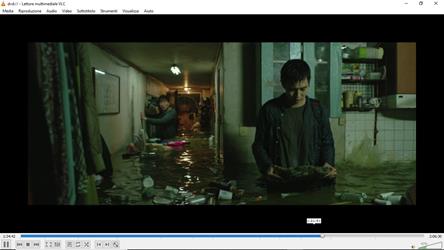“Changeling”.
Not properly an exchange.

The child waiting to be questioned by Police. Screenshot from ‘Changeling’ (2008), directed by Clint Eastwood.
Not for all the actors that special test-bench which is a transition to the direction makes it a success : it is, however, for Clint Eastwood who doesn’t deny his many experiences in the western and action genre.
I’d like to briefly comment “Changeling”[1], a word which doesn’t exist into the Italian language, but it is clear in its original English language : a disappearance with stealth replacement, and also that mental procedure by which someone deceives, or let himself be deceived. And the quiet title does not deceive on the real event which reports and refers – beyond the chilling news – how any deceit and the deceiving itself can hurt, often cruelly, by taking possession of someone else’s life, as if it were just an ‘object’ to collect and to get rid of when is too much.
The deceive is so described by Clint Eastwood as an obvious arbitrariness which the social position allows : whether it is a representative of the institutions or a socially integrated homicidal maniac, or even a desperate woman when they introduce to her a child who is not her missing son.
The director doesn’t take away anything to what the onlookers can have access in order to weigh up, to participate, to judge at last; he does display, without inventing the orders of facts, only using the logic of each character. The presence of a non governmental[2] institution is proving essential to intervene where the bureaucracies corrupt a State, although democratic and Justice hands over, due to men who represent it too : and irreplaceable proves the defense of a lawyer who decides to help Christine Collins releasing her from the psychiatric hospital to where she was committed against her will.
How she could recognize Walter if he was not him ? He was dressed ‘such as’ him, but he was not him…
But if he was ‘such as’ him, why do you say that he was ‘not’ him ?
Swindled, first of all has been Walter Collins, disappeared at the age of nine years on a day like many others but of whom still remain proof in the homicides ranch. And swindled too has been the child introduced to Christine by the Police and doing everything in order to be accepted by her and to get off the road, but she is overwhelmed by her own pain, she only wants ‘her’ son back, or alternatively an admission of error : maybe by governmental representatives ? Or by the maniac himself who, from the prison sends for her just before his own execution ?
Negatively charged is the pain itself because it cannot help any solution, quickening indeed with damages and sweeping away any logic which only could allow at least a slightly favourable result.
Still decisive is finally a child, the first one kidnapped by the maniac and become himself a murderer : while he is waiting to be questioned by the Police and sit in the corridor, he relives the crossroads of his collapse, the madness very very close. By a mental path, absolutely unforeseen but reasonable the same, he asks to speak with the officer[3] who arrested him, and collaborates up to the recognition of the victims and to the terrifiant prooves : his confession can untie just a few of his persecuting memories, but anticipating a possible rehabilitation too.
It’s about an ‘innocence’, by no means taken for granted.
Marina Bilotta Membretti / Cernusco sul Naviglio - January 25, 2021
[1] Inspired by a child kidnapping and murder by a maniac in Los Angeles in 1928, ‘Changeling’ plot and sets are by J. Michael Straczyinski.
[2] Here is the local Presbyterian community and specifically reverend Gustav Briegleb who for years has been fighting against Police corruption.
[3] It is about a private detective for minors – played by John Malkovich – who collaborates with Police and who is entrusted with a report.




